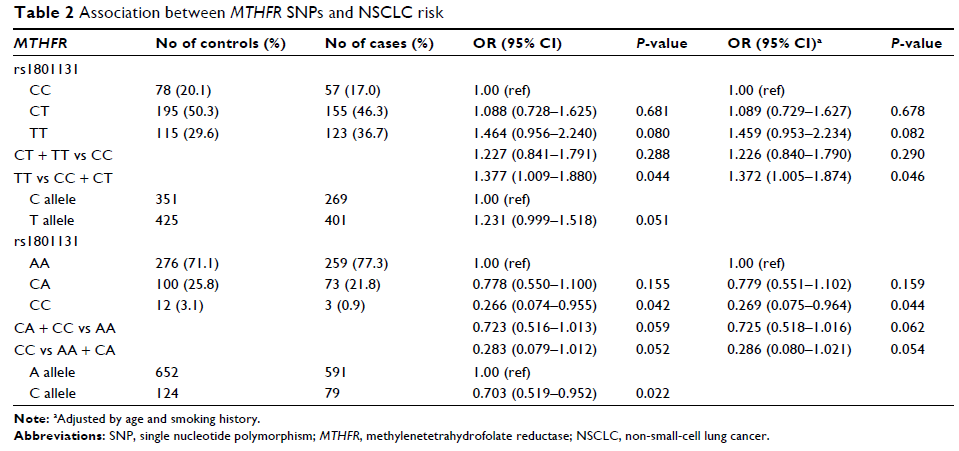108552
论文已发表
注册即可获取德孚的最新动态
IF 收录期刊
- 3.4 Breast Cancer (Dove Med Press)
- 3.2 Clin Epidemiol
- 2.6 Cancer Manag Res
- 2.9 Infect Drug Resist
- 3.7 Clin Interv Aging
- 5.1 Drug Des Dev Ther
- 3.1 Int J Chronic Obstr
- 6.6 Int J Nanomed
- 2.6 Int J Women's Health
- 2.9 Neuropsych Dis Treat
- 2.8 OncoTargets Ther
- 2.0 Patient Prefer Adher
- 2.2 Ther Clin Risk Manag
- 2.5 J Pain Res
- 3.0 Diabet Metab Synd Ob
- 3.2 Psychol Res Behav Ma
- 3.4 Nat Sci Sleep
- 1.8 Pharmgenomics Pers Med
- 2.0 Risk Manag Healthc Policy
- 4.1 J Inflamm Res
- 2.0 Int J Gen Med
- 3.4 J Hepatocell Carcinoma
- 3.0 J Asthma Allergy
- 2.2 Clin Cosmet Investig Dermatol
- 2.4 J Multidiscip Healthc

MTHFR C677T 和 A1298C 多态性与中国女性人群的肺癌风险
Authors Tong W, Tong G, Jin D, Lv Q
Received 4 June 2018
Accepted for publication 11 July 2018
Published 3 October 2018 Volume 2018:10 Pages 4155—4161
DOI https://doi.org/10.2147/CMAR.S176263
Checked for plagiarism Yes
Review by Single-blind
Peer reviewers approved by Dr Cristina Weinberg
Peer reviewer comments 2
Editor who approved publication: Dr Antonella D'Anneo
Objective: To examine the relationship between polymorphisms in the
methylenetetrahydrofolate reductase (MTHFR ) gene and
susceptibility to lung cancer in a female Chinese population.
Method: A hospital-based case-control study of 388 cases and 388 controls
was conducted. Two polymorphisms in MTHFR were
detected using TaqMan methods.
Results: The MTHFR C677T polymorphism
was associated with the risk of lung cancer and lung adenocarcinoma. Carriers
with the TT genotype of C677T were observed to have an increased risk of lung
cancer and lung adenocarcinoma (the ORs were 1.550 and 1.588, respectively). By
contrast, the A1298C polymorphism had a negative relationship with the risk of
lung cancer and lung adenocarcinoma; compared with the AA genotype carriers,
the CC genotype carriers had a lower risk of lung cancer and adenocarcinoma in
the female Chinese population (ORs were 0.302 and 0.215, respectively). In the
stratified analyses, we observed only the A1298C polymorphism in the CC
genotype carriers with a statistically significant reduction in the risk of
non-small-cell lung cancer, compared to the AA genotype carriers. No
significant statistical association was found between the MTHFR gene polymorphisms and
risk of the residual subtype of lung cancer.
Conclusion: This study provides evidence that the MTHFR C677T polymorphism may
contribute to the development of lung cancer and lung adenocarcinoma in a
female Chinese population. However, the MTHFR A1298C
polymorphism may be associated with the decreasing risk of lung cancer.
Keywords: MTHFR , single nucleotide
polymorphism, lung cancer, genetic susceptibility
